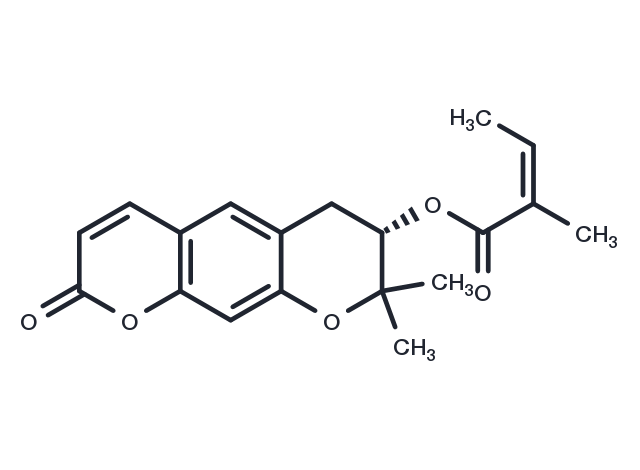Powder: -20°C for 3 years | In solvent: -80°C for 1 year


Decursinol angelate has anti-tumor, anti-inflammatory, anti-oxidant, and hepatoprotective activities, it inhibits VEGF-induced angiogenesis via suppression of the VEGFR-2-signaling pathway; it also suppresses invasion and inflammatory activation of cancer cells through modulation of PI3K/AKT, ERK and NF-kappaB, its anti-inflammatory activity may contribute to its anti-cancer activity.

| Pack Size | Availability | Price/USD | Quantity |
|---|---|---|---|
| 1 mg | In stock | $ 31.00 | |
| 5 mg | In stock | $ 72.00 | |
| 10 mg | In stock | $ 117.00 | |
| 25 mg | In stock | $ 249.00 | |
| 50 mg | In stock | $ 373.00 | |
| 100 mg | In stock | $ 552.00 | |
| 1 mL * 10 mM (in DMSO) | In stock | $ 93.00 |


| Description | Decursinol angelate has anti-tumor, anti-inflammatory, anti-oxidant, and hepatoprotective activities, it inhibits VEGF-induced angiogenesis via suppression of the VEGFR-2-signaling pathway; it also suppresses invasion and inflammatory activation of cancer cells through modulation of PI3K/AKT, ERK and NF-kappaB, its anti-inflammatory activity may contribute to its anti-cancer activity. |
| In vitro | Here, we show that treatment with these compounds improves wound healing by HaCaT human keratinocytes. Wound healing was increased by treatment with up to a threshold concentration of decursin, Decursinol angelate, a mixture of both, and a nano-emulsion of these compounds, but inhibited by treatment with higher concentrations. Immunoblotting and fluorescence imaging of cells expressing an epidermal growth factor receptor (EGFR) biosensor demonstrated that these compounds did not stimulate wound healing by inducing EGFR phosphorylation. Rather, transcriptional analysis revealed that decursin and Decursinol angelate improved wound healing by upregulating the expression of genes encoding extracellular matrix remodeling proteins, inflammatory cytokines, and growth factors. |
| Source |
| Molecular Weight | 328.36 |
| Formula | C19H20O5 |
| CAS No. | 130848-06-5 |
Powder: -20°C for 3 years | In solvent: -80°C for 1 year
DMSO: 65 mg/mL (197.95 mM)
You can also refer to dose conversion for different animals. More
bottom
Please see Inhibitor Handling Instructions for more frequently ask questions. Topics include: how to prepare stock solutions, how to store products, and cautions on cell-based assays & animal experiments, etc.
Decursinol angelate 130848-06-5 Angiogenesis Chromatin/Epigenetic Cytoskeletal Signaling MAPK Tyrosine Kinase/Adaptors ERK VEGFR PKC JNK Protein kinase C inhibit Inhibitor inhibitor
